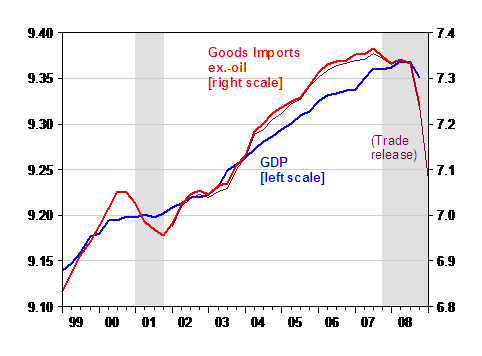The Labor Department reported today that initial claims for unemployment insurance fell by 14,000 during the most recent available week. That brings the 4-week average down for the third consecutive week and puts it 3.3% below the peak reached April 9.
Monthly Archives: April 2009
Good economic news?
Today’s GDP numbers were about what I was expecting. Although economic activity continued its sharp decline, if we continue to follow the script, things should improve.
Links for 2009-04-28
Washington University Professor James Morley on typical recession shapes and why they suggest we might see a strong recovery.
Harvard Professor Lucian Bebchuk on how to buy troubled assets while avoiding some of the problems pointed out by many analysts.
Oil 101 looks like a useful new book by commodity trader Morgan Downey.
And the Shadow Open Market Committee is back in business.
The Decline in US Imports
I’ve been thinking about trying to convey exactly how startling the drop in U.S. imports has been. First, take a look how much non-oil goods imports (in real terms) have dropped, relative to, for instance, GDP.

Figure 1: Log GDP (blue, left scale), log goods import ex.-oil from NIPA (red, right scale), estimated from trade release (purple, right scale), all in Ch.2000$, SAAR. 2009q1 estimate is based on actual January and February data and March estimate incorporating continued 5% decline from February. NBER recession dates shaded gray. Source: BEA, GDP final release of 26 March 2009, February trade release, NBER, and author’s calculations.
Oil shocks and recessions
Here I provide some more background on the relation between oil price increases and economic recessions.
Two Books
…and the Financial and Economic Crisis
I don’t read very many books. At least not during the academic year. But I have read two books recently that are quite germane to thinking about the buildup to the financial crisis, and thinking about how to respond to the current economic downturn. The first is Akerlof and Shiller’s Animal Spirits. The second one is actually not yet out — it’s Justin Fox’s The Myth of the Rational Market (I got a prepublication copy; here’s a hint of it). They are both important books, well worth reading.
Initial claims for unemployment insurance
The Labor Department reported today that initial claims for unemployment insurance rose by 27,000 in the most recent available week. Although that’s a disappointing development, it’s still a small enough increase to allow the 4-week average to fall for the second week in a row. Since that declining 4-week average is one of the few encouraging pieces of news in an otherwise discouraging economic landscape, I wanted to take a closer look at just how significant a statistical signal it really sends.
The Great Recession Goes Global
One of the most interesting “boxes” in the IMF’s World Economic Outlook (in Chapter 1) is the one entitled, somewhat innocuously “Global Business Cycles”, by Marco Terrones, Ayhan Kose and Prakash Loungani at the IMF. Yet, it’s important to read until the ending paragraph:
To summarize, the 2009 forecasts
of economic activity, if realized, would qualify this year as the most severe global recession during the postwar period. Most indicators are expected to register sharper declines than in previous
episodes of global recession. In addition to its severity, this global recession also qualifies as the most synchronized, as
virtually all the advanced economies and many emerging and developing economies are in recession.
Growth Forecasts for 2009-2010 from the IMF
The IMF’s World Economic Outlook (Chapter 1), released this morning, is grim:
The IMF’s Global Financial Stability Report Is Out
Tables 1.3 and 1.4 (tables) in Chapter 1 bear particularly close attention, although the entire text is useful.